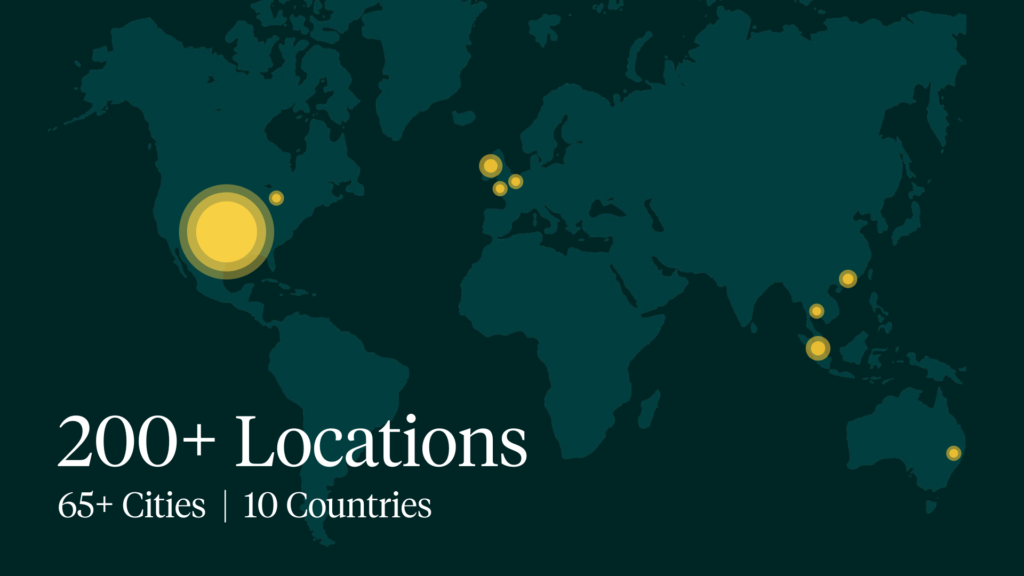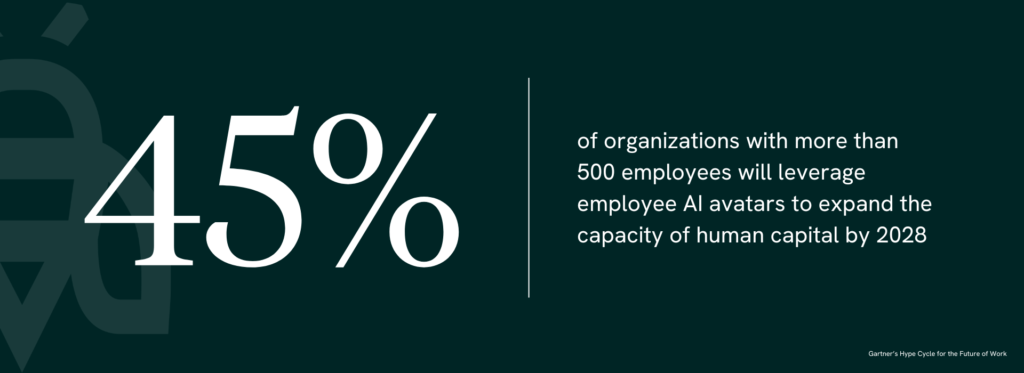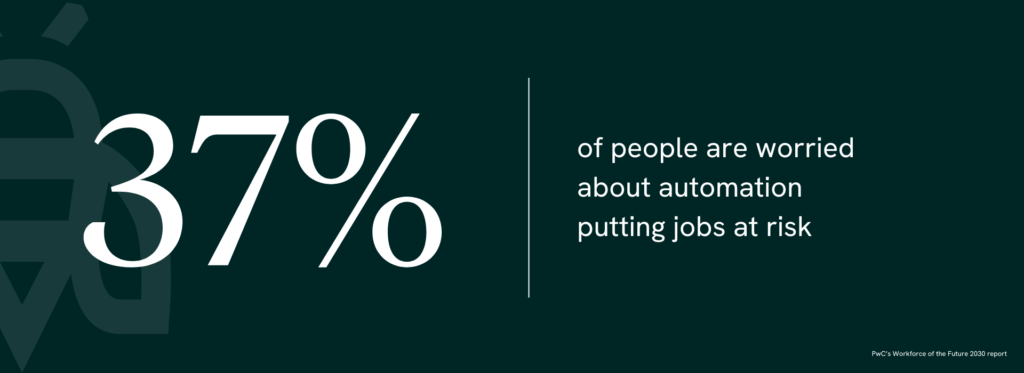Industrious has been opening its doors to workers for over a decade. Our members were once solely described as freelancers or entrepreneurs whose friends looked at them twice when they said they were coworking. Today, our members are professionals from a wide range of industries and company sizes including some of the largest Fortune 500’s. The idea of working alongside like-minded individuals and businesses isn’t second-guessed.
We are in a fortunate position to witness the evolution of work right at our doorsteps – all 200+ of them globally.

Rethinking Work: Five Trends That Will Define the Next Five Years
With our unique vantage point, we’re seeing five main themes that we believe will materially impact work by the time the clock strikes 2030. Here is what we see.
1 | Expectations for exceptional, “super experiences”
Workers like purpose, flexibility, and personalization in their careers.
That means being able to relocate to be closer to family, having the ability to leave work early to pick your kids up from school, and just being trusted to get the job done even if it’s not within 9 to 5.
Some employees commute hours via public transportation, while some can walk to the office. Some have sick family members, or are immunocompromised, while some can’t wait to get back to their desks. Some have families and have to deal with childcare, others are years away from any of that. Recognizing the human element and removing in-office mandates means giving employees options – work at headquarters, from a local no-commute office, attend periodic retreats, adopt the home office – and letting them choose where they can perform their job the best.
Expectations for exceptional, “super experiences” in both work and life are continuously rising. We like to be taken care of, with experiences that you can’t wait to share with the next person. For some, you might just be thinking about a vacation when it comes to being taken care of, but that can happen at work, too.
We are noticing that people are increasingly using data and digital tools to quantify their well-being and productivity, fostering a more self-aware workforce. As that evolution happens, demands for purpose and personalization will only grow. Organizations can play a greater role in helping individuals navigate a content-driven economy where personal branding and standout performance are critical to success.

2 | A new focus on learning and gathering emerges
Work isn’t necessarily about your technical skill level anymore. It’s about your ability to quickly learn and your willingness and curiosity to do so.
Automation and AI are creating new types of jobs while transforming existing roles, placing lifelong learning at the center of career development. For example, Gartner’s Hype Cycle for the Future of Work, 2024 found that by 2028, 45% of organizations with more than 500 employees will leverage employee AI avatars to expand the capacity of human capital. That means that higher education is shifting to accommodate continuous skill development, offering more flexible, on-demand learning opportunities.
At the same time, the way we are digesting information is changing. Sprint-based work methods are replacing lengthy meetings, enabling faster decision-making and execution. As remote work remains prevalent, travel and immersive technologies are enhancing the quality of in-person gatherings. In-person meetings are something to look forward to now that it isn’t always the norm. When that meeting time is curated intentionally, with a nod to purpose and personalization, it’s well worth everyone’s efforts.
These changes play a hefty role on managers, who are evolving into coaches, blending accountability with empathy to support employee growth and wellbeing. It’s a new tall task.
The meaning of productivity itself is shifting from something cold and inhumane – how many widgets of output can I get per hour of labor input – to something much more human: not “how do I get the most out of my teams,” but “how do I get the best out of them?”

3 | Power is shifting to the team
Goodbye rigid, hierarchical structures. Hello dynamic, self-organizing networks.
Traditional organizational charts of boxes and lines are being replaced by skills-based ecosystems where teams form and dissolve based on project needs. That means that decentralized decision-making is becoming the norm, with companies increasingly outsourcing services to external partners.
This shift empowers teams to take greater collective responsibility, while gig work continues to rise, lowering long-term institutional affiliations. And that trend is accelerated by AI, which – whether we like it or not — is reducing the number of full-time employees required for certain tasks. PwC’s Workforce of the Future 2030 report identified that 37% of people are worried about automation putting jobs at risk. At the same time, companies are investing in new executive roles focused on shaping the employee experience, redefining what it feels like to work within an organization.
4 | Real estate becomes democratized
Buildings are increasingly being operated like products.
Owners are focused on delivering tenant experiences rather than just leasing space. Traditional office brokers are giving way to what we dub “brandlords,” also known as people who curate spaces with strong identities and service offerings.
Meanwhile, companies are shifting resources from fixed office footprints to networks of third places – on-demand workspaces that cater to diverse needs. And AI is being leveraged here, too, to orchestrate seamless workplace journeys. That means modular construction and intelligent buildings can enable adaptive, as-a-service consumption models for space and furniture.
The other advantage is the ability to move away from giant open floorplan workplaces. Industrious has been working for years to shift the workplace from a static open floorplan pit into a dynamic complex of both public and private spaces that allow employees peace, quiet, and privacy when they need it.
5 | Cities compete for talent like never before
Every city wants you to come work there. That’s not necessarily new.
Today, though, cities are shifting their value proposition from job availability to overall desirability and quality of life. Things like growing climate concerns and geopolitical tensions are creating new political zones and desirability bubbles.
We believe that super-cities, places with 15-minute walkability and micro-mobility infrastructure, are becoming magnets for top talent. Networks of third places are being used to replicate the campus feel of large corporate offices, fostering collaboration and social connection. IPUT’s global research report Making Place: The Recalibration of Work, Life and Place highlighted the social, cultural and economic importance of placemaking and found that 44% of typically office-based employees rank the quality of the local environment as a top three consideration when choosing a place to live. New development is honing in on this recipe for success. As demand for certain asset types fluctuates, many buildings are changing hands, reshaping urban landscapes to better align with evolving work preferences.
While that’s going on, governments are offering incentives, visas, and community-building programs to attract remote workers, bringing the real estate conversation beyond just the United States.
Industrious has the opportunity to deliver a distributed workplace network that gives companies the ability to bring down their real estate costs and variegate something that absolutely needs to be variable at a moment like this while unlocking the right for employees to work from anywhere.

Rethink space, strategy, and culture to stay competitive
So, with all of these trends in mind, what should companies do? Here’s what we recommend:
- Provide a clear framework vs. a mandate – Give people as much choice/ability to personalize as possible within a framework that works for you. Mandates by themselves won’t drive long-term engagement and retention.
- Have access to network in third spaces that people can gather for specific purposes, make sure the experience is super high quality
- Invest in gathering people and making gathering intentional (think beyond the happy hour, focus on learning & purpose); Allocate more of your budget for travel, less for office space
- Provide space for the long tail of distributed people – there’s a benefit to those people having relationships, even if they don’t work on the same team
- Test the “Let’s see where they go and we’ll build there” model versus just telling people where to be
- Create more holistic ‘great building experiences’ rather than focusing on just your own floorplan.

How Industrious can help
- Our spaces are the highest quality in the industry at scale – if you want a consistent global experience that’s super high quality, there’s no other partner.
- We can provide access for the long tail of people who are in geographic pockets where it doesn’t make sense to have a dedicated office (<50), or fully remote, or travel a lot, or want to meet sporadically.
- We can develop custom solutions that help meet the needs of large teams and provide flexibility within your broader portfolio strategy.
- We’re experts at gathering. We can help your team with effective offsites, meetings and anything in between.
- You can use us to build flexibility into new spaces you’re developing.
- We can help you articulate the business case for flex and it’s place in your workplace strategy internally.
Get in touch
If you want advice on how to think about flex as part of your workplace strategy get in touch and our team will happily talk you through it in detail. Visit industriousoffice.com/enterprise to learn more and start your consultation.